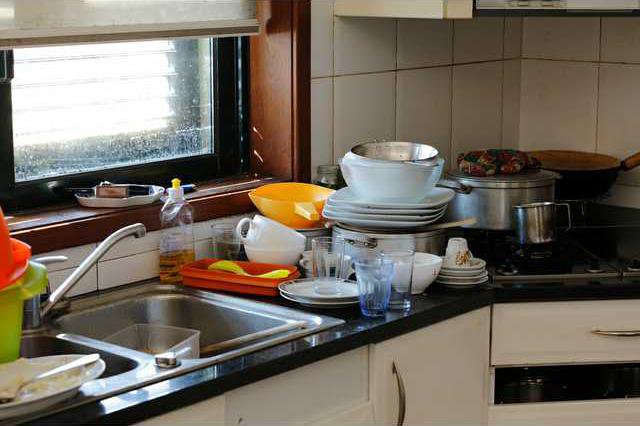Knives everywhere, heavy cookware, raw foods, old bacteria...the list of reasons why the kitchen can be harmful goes on and on.
According to the statistics from the Centers for Disease Control and Prevention, at least 2 million people become infected with foodborne bacteria each year and at least 23,000 people die from these types of infections.
Those statistics are scary, even without little children to worry about. The ways your kids can hurt themselves in the kitchen is probably longer than all the Harry Potter books combined. The goods news is there are many easy solutions to make your kitchen a safer place for not only your children, but you as well.
1. Know how to use a sponge
What do you do with your sponge once you have finished washing the dishes? The correct answer is to clean it and store it away from the sink. If you leave even the smallest bit of food on the sponge, bacteria will accumulate on the surface making it a health hazard to use again. Laying down your bacteria infested sponge next to a wet surface (like the sink) causes the germs to grow at a much faster rate. Quickly sanitize your sponge after use by microwaving it for two minutes. Above all, replace kitchen sponges frequently.
2. Stop cross-contaminating your meats
Once a raw piece of meat has touched a plate, nothing else should be placed on it. Hand wash all surfaces immediately to remove the bacteria before it grows. The same goes for counter spaces, cutting boards, pans, etc. It's easy to forget that the tongs you flipped the chicken over with shouldn't be used for the salad if it's left on the counter. Immediately washing surfaces that have come in contact with raw meat is an easy way to keep your family safe.
3. Avoid waiting to place hot food into the fridge
Even though your homemade soup is scorching hot, dont leave it out until it is completely cooled before sticking it into the fridge. Leaving out hot foods for too long allows bacteria to grow. Wait for a few minutes so you dont have too much condensation build up in your Tupperware container before sticking warm foods in the fridge.
4. Wash your fruits, vegetable, and meats before consumption
There are chemicals, dirt, and other germs on your fruits and vegetables when you bring them home from the store. Washing your food before eating cuts down on the risk of injesting these chemicals and other harmful materials.
5. Turn pot handles away from the front of the stove
Children are very curious, especially in the kitchen. They have never used an oven, microwave, or knife before which will make them wonder how to. To prevent an accident, keep the handles of your pots and pans on the stove away from you. Kids are less likely to reach up and grab the pot if the handle is out of reach.
6. Wash your hands before handling food
This one is very self-explanatory but can be difficult to remember, especially if you are a busy mom who is constantly interrupted. You must wash your hands before you handle food, especially poultry and meats.
7. Keep plugs and cords unfrayed and hidden well
Electrical shocks happen more often then you may think. Especially in the kitchen, it is important to keep all electrical appliances in proper working order. Spilled liquids and frayed cords are not a good mix.
8. Clean up spills and counters immediately
When cooking, it is easy to forget the spills you have made only to slip into them later on. Not only is this dangerous because you will likely fall and hurt yourself, but if you forget to wipe off a counter that was used to dice raw chicken, the next thing that gets placed there will be contaminated by bacteria. Wipe up everything right away to avoid both issues.
According to the statistics from the Centers for Disease Control and Prevention, at least 2 million people become infected with foodborne bacteria each year and at least 23,000 people die from these types of infections.
Those statistics are scary, even without little children to worry about. The ways your kids can hurt themselves in the kitchen is probably longer than all the Harry Potter books combined. The goods news is there are many easy solutions to make your kitchen a safer place for not only your children, but you as well.
1. Know how to use a sponge
What do you do with your sponge once you have finished washing the dishes? The correct answer is to clean it and store it away from the sink. If you leave even the smallest bit of food on the sponge, bacteria will accumulate on the surface making it a health hazard to use again. Laying down your bacteria infested sponge next to a wet surface (like the sink) causes the germs to grow at a much faster rate. Quickly sanitize your sponge after use by microwaving it for two minutes. Above all, replace kitchen sponges frequently.
2. Stop cross-contaminating your meats
Once a raw piece of meat has touched a plate, nothing else should be placed on it. Hand wash all surfaces immediately to remove the bacteria before it grows. The same goes for counter spaces, cutting boards, pans, etc. It's easy to forget that the tongs you flipped the chicken over with shouldn't be used for the salad if it's left on the counter. Immediately washing surfaces that have come in contact with raw meat is an easy way to keep your family safe.
3. Avoid waiting to place hot food into the fridge
Even though your homemade soup is scorching hot, dont leave it out until it is completely cooled before sticking it into the fridge. Leaving out hot foods for too long allows bacteria to grow. Wait for a few minutes so you dont have too much condensation build up in your Tupperware container before sticking warm foods in the fridge.
4. Wash your fruits, vegetable, and meats before consumption
There are chemicals, dirt, and other germs on your fruits and vegetables when you bring them home from the store. Washing your food before eating cuts down on the risk of injesting these chemicals and other harmful materials.
5. Turn pot handles away from the front of the stove
Children are very curious, especially in the kitchen. They have never used an oven, microwave, or knife before which will make them wonder how to. To prevent an accident, keep the handles of your pots and pans on the stove away from you. Kids are less likely to reach up and grab the pot if the handle is out of reach.
6. Wash your hands before handling food
This one is very self-explanatory but can be difficult to remember, especially if you are a busy mom who is constantly interrupted. You must wash your hands before you handle food, especially poultry and meats.
7. Keep plugs and cords unfrayed and hidden well
Electrical shocks happen more often then you may think. Especially in the kitchen, it is important to keep all electrical appliances in proper working order. Spilled liquids and frayed cords are not a good mix.
8. Clean up spills and counters immediately
When cooking, it is easy to forget the spills you have made only to slip into them later on. Not only is this dangerous because you will likely fall and hurt yourself, but if you forget to wipe off a counter that was used to dice raw chicken, the next thing that gets placed there will be contaminated by bacteria. Wipe up everything right away to avoid both issues.








